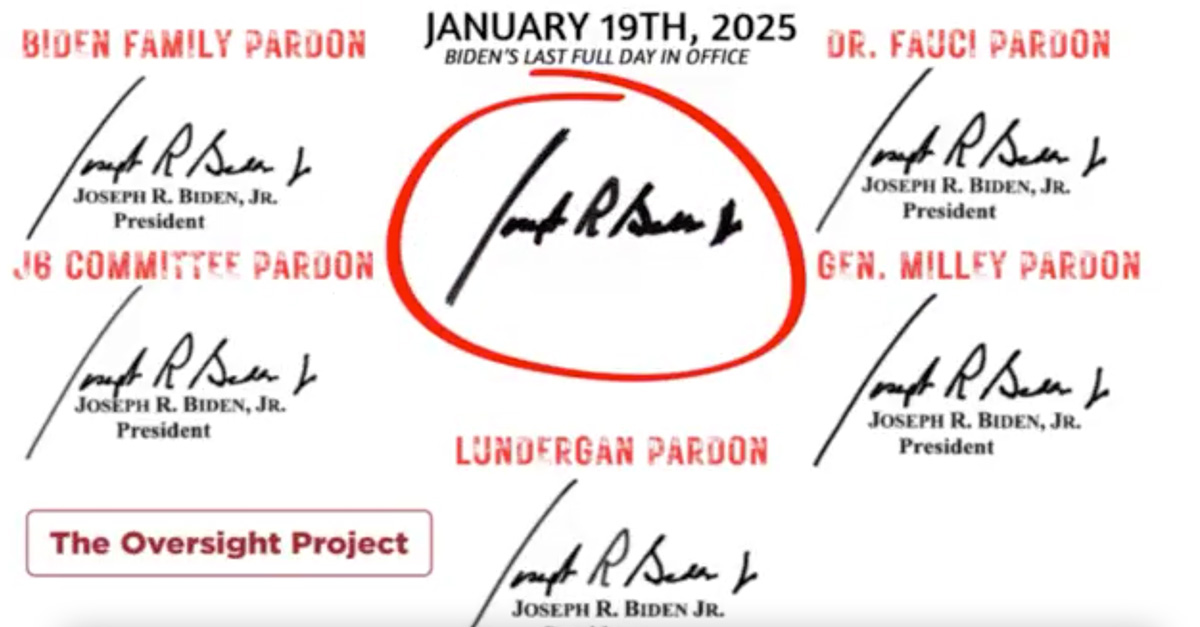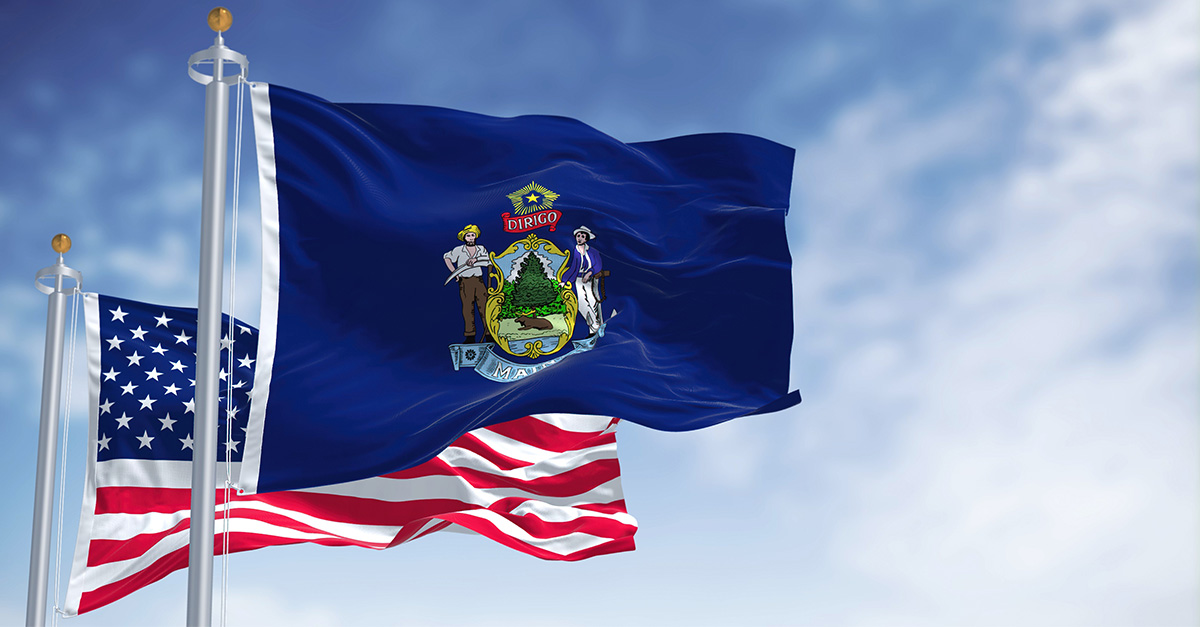


Get a free copy of Parental Rights & Education when you subscribe to our newsletter!

The last-minute pardons issued by President Biden — many of them preemptive, many via autopen — raise a number of legal, constitutional, and political questions, but from a biblical stance, a legitimate pardon must align with justice, truth, and accountability.
Former President Donald Trump has declared that the pardons issued by President Joe Biden for January 6 defendants are “null and void,” alleging that they were signed using an autopen without Biden’s direct knowledge or consent. This assertion that someone else might have been signing President Biden’s name to official Presidential actions raises questions about the legitimacy of such pardons, the historical use of the autopen by U.S. presidents, and the broader implications from both legal and biblical perspectives.
The U.S. Constitution grants the President the power to issue pardons as an act of mercy, freeing those convicted of crimes from their legal penalties. This authority is outlined in Article II, Section 2, which states that the president “shall have power to grant Reprieves and Pardons for Offenses against the United States, except in Cases of Impeachment.”
Traditionally, a pardon acknowledges that the president is exercising clemency for an individual who has been found guilty under the law. In rare cases, presidents have granted pardons before a conviction, such as Gerald Ford’s pardon of Richard Nixon in 1974. However, in every instance, the underlying assumption is that a crime was committed, or at least alleged.
While most pardons follow a conviction, preemptive pardons have occurred. President Ford’s pardon of Nixon was notable, because Nixon had not yet been charged with a crime. Similarly, President Jimmy Carter issued a blanket pardon for Vietnam War draft dodgers, even though many were not formally convicted. These instances demonstrate that a pardon does not necessarily require an existing conviction, but still assumes legal wrongdoing.
By contrast, Joe Biden’s preemptive pardons not only didn’t cite a crime, some of them didn’t even provide the simplest hint of when, where, or how a crime may have occurred for a several year period, in some cases going back more than a decade to 2014. These seemingly free passes were given to Biden family members, certain members of Congress, and high-ranking government employees, most notably Anthony Fauci and Gen. Mark Milley.
From a biblical standpoint, justice and mercy are inseparable. The concept of a pardon aligns with biblical principles of forgiveness, but it must be anchored in truth. Throughout Scripture, God’s forgiveness is tied to repentance and acknowledgment of wrongdoing. The idea of granting a pardon to someone who has not committed a crime raises theological and moral concerns. If there is no crime, what exactly is being forgiven?
The Bible repeatedly affirms that justice requires fairness and integrity. Proverbs 17:15 warns, “He who justifies the wicked and he who condemns the righteous are both alike an abomination to the Lord.” This principle suggests that granting pardons indiscriminately, without legal basis, undermines justice rather than upholding it.
Additionally, Romans 13:1-4 affirms that rulers are meant to be God’s servants for justice, rewarding good and punishing evil. A pardon that lacks legal justification could be likened to a ruler abdicating his responsibility to uphold justice. While mercy is a Christian virtue, it must be exercised within the framework of truth and righteousness.
One critical question is whether a presidential pardon can be nullified after it has been issued, especially if questions arise about intent. Historically, no U.S. court has overturned a pardon based on claims that it was issued improperly. Once granted, a pardon is typically considered final.
However, the Trump administration previously argued that certain pardons could be challenged if they were issued under corrupt circumstances. This raises the possibility of legal action if it can be proven that Biden did not knowingly authorize these pardons.
Legal scholars are divided on this issue. Some argue that since the Constitution grants the president absolute authority to pardon, any such act is irrevocable. Others contend that if a pardon is issued through deception or fraud — such as an unauthorized use of an autopen — it could be deemed invalid. However, no court has ever ruled on such a case.
Trump’s argument hinges on the use of an autopen, a device used to replicate someone’s signature for efficiency. While modern presidents have employed autopens for routine documents, including military commissions and condolence letters, their use in pardons and other official and uniquely presidential acts is contentious.
Legally, an autopen-signed pardon is valid if authorized by the president. However, Trump contends that Biden’s cognitive state makes it unclear whether he personally approved these pardons, calling into question their legitimacy. This is not merely a procedural debate — it’s about presidential intent. If Biden did not knowingly authorize these pardons, Trump’s claim of nullification could carry weight.
And in fact, his team may seek to challenge auto-signed pardons through the courts by presenting evidence that Biden did not review or approve them. If successful, the ruling could set a precedent where pardons are no longer considered automatically valid if signed by an autopen.
The courts would have to determine whether a president must be consciously aware of and approve a pardon for it to be legally binding. If Trump’s argument succeeds, it could have far-reaching implications, potentially restricting the use of autopens for all presidential acts.
Beyond the legal and constitutional arguments, this controversy raises deeper political and cultural implications.
Biden’s awareness of these pardons remains a key issue, as it raises concerns about transparency and accountability within the executive branch. It also raises questions about who is truly running the executive branch.
Moreover, this case could impact the ability of future presidents to issue pardons, potentially leading to new regulations requiring explicit intent verification. Some lawmakers have already suggested that all presidential pardons should require in-person signatures or verbal confirmation.
Trump’s challenge to Biden’s pardons raises legal and theological concerns. While a pardon is an executive privilege, its application must align with justice and accountability. If Biden was unaware of the pardons, this raises legitimate questions. Pardoning individuals who have not been convicted challenges traditional legal and biblical understandings of justice, which emphasize accountability for wrongdoing.
As Christians, we must advocate for both mercy and truth, ensuring that justice is not perverted under the guise of political maneuvering. An improper pardon not only weakens the rule of law but also undermines the very principle of justice it is meant to uphold.
PHOTO: A screenshot of an analysis done by the Heritage Foundation’s Oversight Project of the pardons granted on January 19, 2025, by President Joe Biden, which included top-ranking officials on the January 6 Committee, Anthony Fauci, Gen. Mark Milley, and several members of the Biden family.
If you like this article and other content that helps you apply a biblical worldview to today’s politics and culture, consider making a donation here.


Notifications